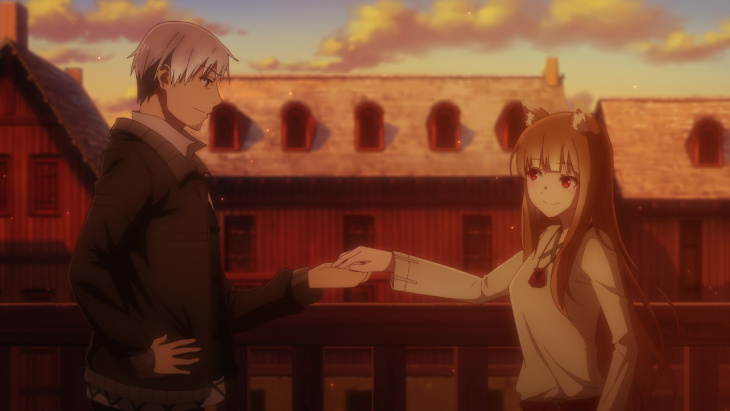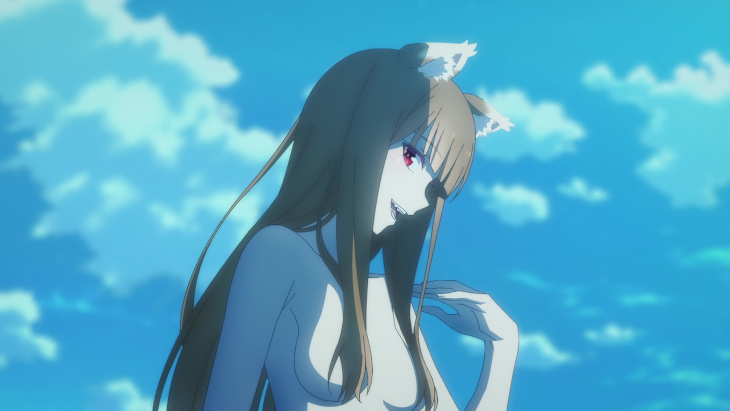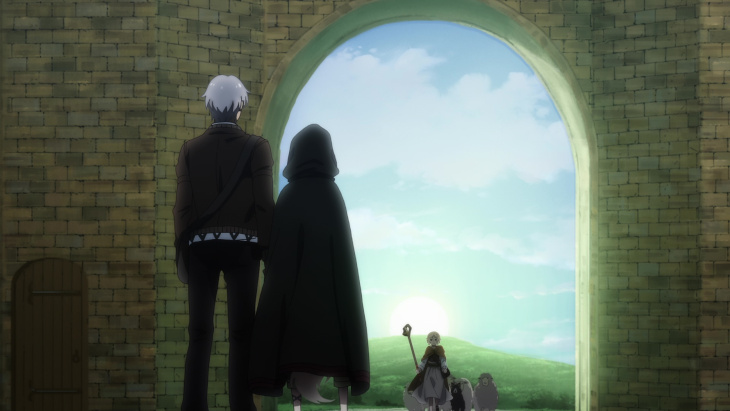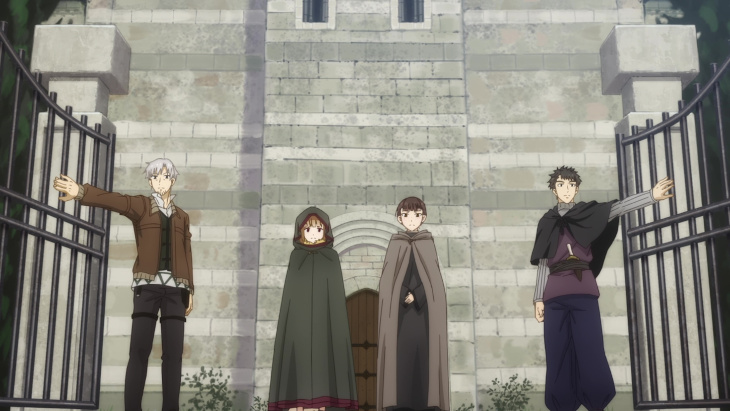
“That tongue of yours has become quite eloquent… I have gotten quite a troublesome companion for my journey.”
Of the series I’ve followed this summer, only Spice and Wolf had carried over from the preceding spring. Everyone has at least a few opinions which place them at odds with a community they’re part of, particularly a fandom. I certainly have my share, and one of them was the view that the original Spice and Wolf from 2008 isn’t good. I observed as much in my first impressions review in April, but it bears repeating, as I think this new adaptation has outstripped it in nearly every way.
It still faces some of the same issues as the original, but even those are alleviated by superior production values and pacing. It’s hard for me to evaluate how fans of the series will receive this updated version, but I found it to be an enjoyable exploration of its world and economics. Plus, the fact that we’ve already had an announcement for another season automatically gives it a leg up on the original run, which covered a roughly equivalent amount of material.

For those unfamiliar with the franchise, Spice and Wolf follows the exploits of the merchant Kraft Lawrence as he travels alongside the wolf goddess Holo. Holo has spent ages serving as the goddess of a small farming village in the south, and seeks to return to her hometown, Yoitsu, in the north. As they travel, they look for information on Yoitsu, while also seeking to make a profit. I’ve never been fond of the main pairing, probably due to both characters being a little abrasive. Kraft can be matter of fact and aloof to a fault, and Holo’s tendency to get irritated and aggressive results in a couple where neither side connects with me. While this issue is still present in the reboot, I found their back and forth to be more playful than it was in the original. I don’t know if this is due to nuance in the presentation, or because I’m a different person than I was fifteen years ago. It could be both, but I found their interactions more engaging than I did in the past.

Other than our main leads, we don’t have many recurring characters. Since Kraft and Holo are traveling across the countryside, each arc has its own location and cast. The one constant is the economic machinations, which I also found uninteresting in the original adaptations. This is not necessarily a fault of the original anime, but rather the medium itself. Presenting economic scenarios works far easier in a book, where you have the immediate option to reread a series of lines until their meaning clicks. In a show, you’re dependent on the audience either possessing the wherewithal to absorb the meaning the first time through, or proving patient enough to rewind and rewatch it until any confusion is alleviated. Even Hollywood blockbusters like The Big Short struggle with this dilemma, and while I was more absorbed by this reboot than the 2008 version, it still didn’t nail the landing with some of its economic breakdowns. I’m not sure what the best solution is here (No, it isn’t Margot Robbie in a bathtub explaining how shorting stock works). Spice and Wolf doesn’t tend to use fancy visuals to break down the machinations at play during some of their trades, but doing so might make the market manipulations and strategies a little more digestible moving forward.

The production for this series was handled by Passione, in what is their most high profile series to date. I don’t associate the studio with breathtaking visuals, and fortunately that isn’t what Spice and Wolf calls for. This is setting up to be a backhanded compliment, but they do their job and ensure the series looks pleasant. Fans might be put off by some of the softer visuals compared to the original anime, but light novel adaptations allow for more artistic interpretation of the visuals than manga adaptations. And let’s just come out and say it. The original series were ugly, even when they were airing. They had stiff animation and flat visuals. Passione may not be setting the world on fire with this production, but for a series like this, I prefer comfortable and straightforward material rather than an experimental misstep.
The music falls into a similar category. Nothing about it was memorable to me, but none of it was bad. The OPs and EDs are more notable for their fun visuals than the music, and even now I’m struggling to remember how they sounded. Everything does its job, and given this is the studio that brought us season 4 of High School DxD and this year’s Ishura, that’s all I’m willing to ask for.
Before I wrap up, a few Notes and Nitpicks:
- It seems like many voice actors are returning to reprise their roles between both the Japanese and English versions. It’s impressive to see such commitment from the cast after such a span of time. I’d presume the voices are iconic to fans of the original series, but while I know I watched it at the time, I doubt I’d have noticed if they were recast. Then again, given that I watched it in Japanese, I wasn’t dependent on the voices to understand the dialogue.
- Going back to the original designs, am I the only one who thought Holo looked like she was based on a fox and not a wolf? The old series had really pointy ears, and when combined with the auburn fur, there was always a disconnect in my mind. The new series depicts her wolf-like features a little more convincingly, though the hair color still brings foxes to mind.
- For a moment, I was about to ask why Brain’s Base didn’t come back to work on this new season, since they did season 2 of the original run, and the studio is still around. However… I like some Brain’s Base productions, but that might actually be a bad idea. It’s been nearly a decade since I saw them release a show that didn’t look cheap.
- My understanding is that the original two season run covered much of the same material from this one, though it altered some events, and skipped the final story of this season in favor of a subsequent book’s plot.
- I’ve gotten a little lazy this past week, so I don’t know if I’ll have time to review Senpai wa Otokonoko, but if I don’t, it’s worth checking out. I haven’t even finished it, but its approach to its subject matter is worthy of viewing.
Spice and Wolf is a legacy title that never clicked with me the first time around. While this iteration still has some issues in how it tells its story, it does alleviate many of the problems that crippled the original production. Given that another season has already been announced, promising to take the story further than it had previously, longtime fans are duty bound to jump on board, and anyone curious about the franchise should give this a chance.




Add comment